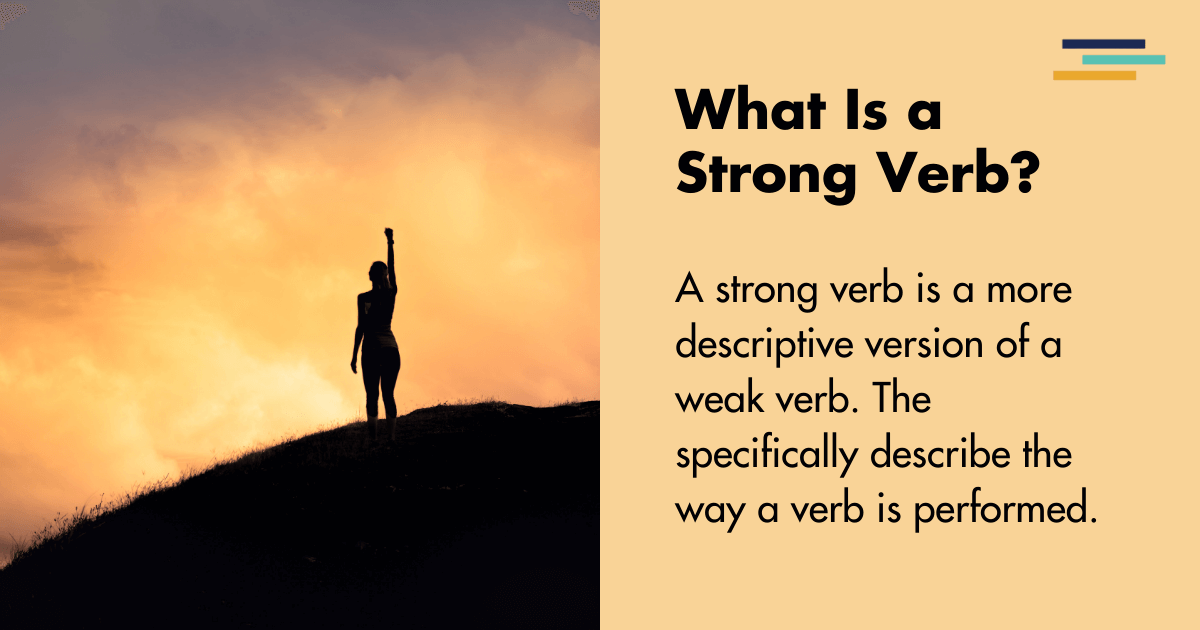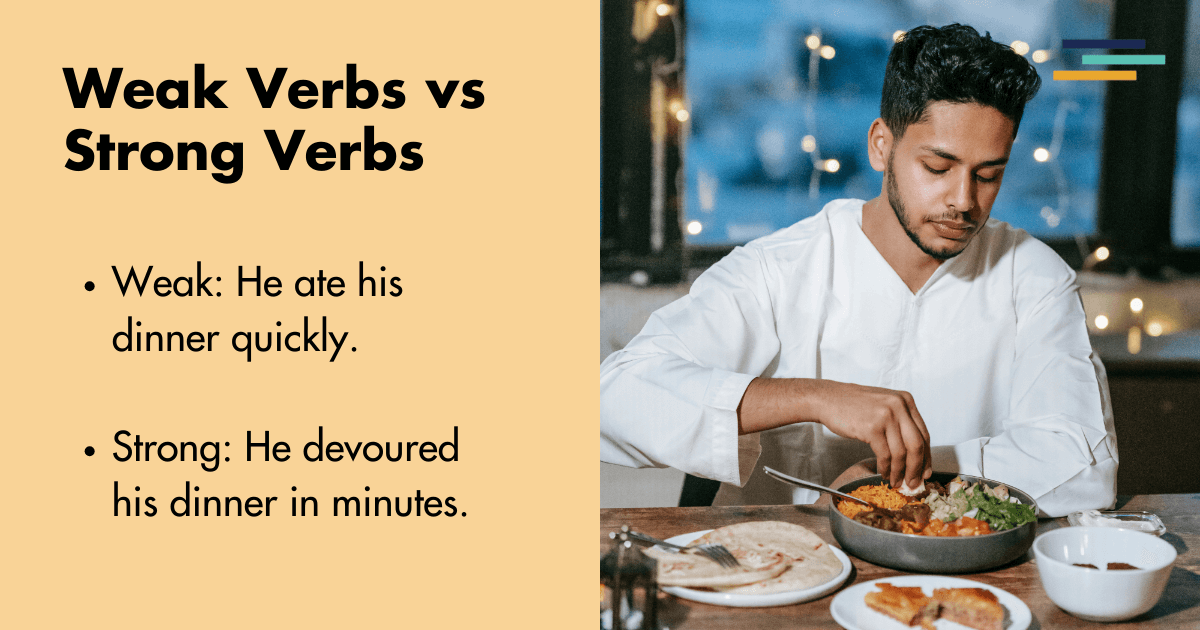
You found your story. You plotted or pantsed your way through a first draft and used Fictionary to edit and fine-tune your story structure.
Now it’s time to review your prose. Have you used words that will connect readers to your characters, plot, and setting? Are you using strong verbs?
What is a Strong Verb?
Using strong verbs in writing means choosing words that are specific, vivid, and convey actions with no additional adjectives or adverbs. Strong verbs enhance the clarity and impact of your prose, making it more engaging and dynamic. They are concise and therefore use fewer words.
Using weak verbs fails to convey the strong meaning of our images. We could prop them up with adverbs, but it often adds unnecessary detail that doesn’t enhance the image. Adverbs can dilute the impact of a sentence by adding qualifiers.

Strong Verbs vs. Weak Verbs
What do we mean when we talk about weak verbs? Let’s start with some sample sentences: “Hayley walked to the door.”
We know what she’s doing, but it’s so generic that there’s no clue as to its relevance. Let’s add an adverb: “Hayley walked angrily to the door.”
Now we have an idea that Hayley may have something on her mind or is reacting to something, but it still lacks punch. Tacking on an adverb is not the best way to add pizazz to the action. Let’s change to a strong verb: “Hayley stormed to the door.”
There’s no question Hayley is angry and is moving toward the door. With a simple one-word change employing a powerful verb, the sentence presents a vivid image of the character’s action and the associated emotion. It helps the reader sense Hayley’s anger and connects them to the scene.
To intensify the sense of rage, you could add one more thing: “Hayley stormed to the door and slammed it behind her.”
There’s no doubt left in your reader’s mind: Hayley is angry.
Here’s another example with weak verbs: “George pressed the gas pedal with all of his might, successfully outrunning his pursuers.”
And here is the same example with strong verbs: “George stomped on the gas pedal, obliterating his pursuers in a cloud of dust.”
Both sentences tell us that George is trying to escape people chasing him. But the second example gives us a sense of George’s determination and success in doing so.
Using powerful verbs is a component of the show, don’t tell mantra that is repeated in many writer’s workshops and webinars. Having a structurally sound story that is paced well and has compelling characters is the foundation of effective writing. Once you start editing your prose, it’s vital to use words that do your story justice and keep your readers engaged, sensing what your characters are experiencing and forming an emotional attachment to them.
Here are two examples of telling vs. showing:
- Mimi was happy. (telling)
- Mimi’s eyes sparkled and her cheeks flushed, her smile lighting the room. (showing)
- Robert was a fast walker. (telling)
- Robert’s pace eclipsed that of the other walkers. (showing)
Letting your descriptive words see through the lens of your character helps readers picture the action and the emotion. Telling them leaves them out of the experience. Using strong verbs anchors readers in the emotion your character is feeling.
Strong verbs often reduce the number of words needed to provide a clearer picture of the action but not always. For instance:
- Weak: He ate his dinner quickly.
- Strong: He devoured his dinner in minutes.
- Weak: I thought about the problem.
- Strong: I pondered over the problem for hours.
- Weak: The audience laughed at the joke.
- Strong: The audience guffawed at the comedian’s joke.
Even though the strong versions of these sentences contain more words, they enhance the meaning and power of the image. As you get used to employing strong verbs in your writing, the choices you make will reflect your overall writing style.

How to Use Strong Verbs in Your Writing
Consider the following tips to identify weak verbs and replace them with stronger ones:
- Replace adverbs: Don’t consider the use of adverbs forbidden, but it’s still a good idea to review your prose for the use of adverbs to reveal places where using a strong verb instead strengthens your writing.
- Check for “to be” verbs: Often, using forms of “to be” signals weak verbs. Choose active verbs in their place. Instead of “I was thinking,” try “I reflected,” or “I contemplated.”
- Avoid passive voice: Using passive voice is not always bad. But using it frequently leads to weaker verb choices. Your prose will be more direct and energetic by employing active voice. Note this example of passive voice:
- The paper was graded by the teacher: This shows the subject acted upon by someone else. It diverts attention from the teacher to the paper, an inanimate object.
- The teacher graded the paper: This version of the sentence keeps the emphasis on the teacher as the subject and makes the meaning clearer.
- Visualize the action: If you can’t picture the action clearly, the verb might be weak. Strong verbs create vivid images in the reader’s mind.
- Use specific actions: Replace general verbs with specific ones that describe the action more precisely. Instead of “She did her hair,” substitute “She styled her hair,” or “She straightened her hair.”
- Read aloud: Reading your writing aloud, either yourself or using software, may help you hear where the language falls flat and you need stronger verbs.
- Consult a thesaurus: Never underestimate the value of finding a synonym! Just ensure that the verbs you choose fit the context and maintain the voice of your narrative.
Strong Verbs List for Fiction
Consider the following list of weak verbs and stronger counterparts for use in your writing. The weak verbs are in bold, and the stronger verbs are displayed in the tables below.
| Look | ||
| Glimpse | Gape | Gawk |
| Peek | Peer | Stare |
| Scan | Skim | Ogle |
| Admire | Appraise | Observe |
| Examine | Rubberneck | Gaze |
| Inspect | Survey | Squint |
| Glare | Sneer | Eye |
| Change | ||
| Adjust | Alter | Amend |
| Tweak | Transform | Convert |
| Replace | Transmute | Modify |
| Refine | Revise | Substitute |
| Eat | ||
| Dine | Lunch | Sup |
| Gobble | Gorge | Nosh |
| Wolf | Feast | Taste |
| Snack | Nibble | Overindulge |
| Make Noise | ||
| Crack | Echo | Hum |
| Chime | Drone | Buzz |
| Ding | Toll | Warble |
| Beep | Chirp | Creak |
| Rustle | Swish | Bark |
| Put | ||
| Lay | Place | Rest |
| Center | Park | Situate |
| Drop | Plop | Plunk |
| Deposit | Position | Set |
| Run | ||
| Bound | Dart | Dash |
| Scurry | Fly | Gallop |
| Sprint | Jog | Bolt |
| Escape | Race | Stampede |
| Storm | Lope | Surge |
| Sit | ||
| Perch | Roost | Park |
| Squat | Sprawl | Recline |
| Talk | ||
| Advertise | Announce | Articulate |
| Cajole | Beseech | Mumble |
| Stammer | Nag | Implore |
| Enunciate | Gloat | Herald |
| Preach | Proclaim | Orate |
| Admonish | Chasten | Scold |
| Babble | Torment | Chatter |
| Stop | ||
| Cease | Curb | Block |
| Delay | Freeze | Halt |
| Finish | Culminate | Squelch |
| Suspend | Quash | Arrest |
| Discontinue | Adjourn | Terminate |
Strong Verb Examples for Poetry
Strong verbs in poetry are those that convey action, emotion, or a state of being with clarity and power, often transforming the mundane into something memorable. The right verbs can express eloquence, beauty, terror, or countless other emotions. Here are some examples of strong verbs used in poetry:
- Illuminate: to light up or make clear
- Shatter: to break into pieces suddenly
- Galvanize: to stimulate or excite as if by an electric shock
- Meander: to follow a winding course
- Whisper: to speak very softly or quietly
- Saunter: to walk in a slow, relaxed manner
- Plummet: to fall or drop straight down at high speed
- Soar: to fly or rise high in the air
- Captivate: to attract and hold the interest and attention of
- Devastate: to destroy or overwhelm
Choose these verbs for their ability to create a potent image or emotion and to give the reader a more immersive experience. Incorporating such verbs into your poetry can elevate your writing, making it more engaging and impactful. Experiment and see how these verbs change the tone and impact of your verses.

How to Pick the Best Strong Verbs for Your Writing
Here are some points to ponder when considering powerful verbs in your writing:
- Focus on specificity: Use every opportunity to replace generic verbs with ones that convey precise meaning. Choose “stroll,” “meander,” “march,” or “scurry” instead of “walk.”
- Avoid State-of-Being Verbs: It is impossible to write without using these verbs. They appear in this article. But when a sentence sags, it probably contains at least one of these:
| Is | Have | Should |
| Am | Has | Would |
| Are | Had | May |
| Was | Do | Might |
| Were | Does | Must |
| Be | Did | Can |
| Being | Shall | Could |
| Been | Will |
Minimizing usage of these verbs in your writing can bring more life and color to your prose.
- Scrutinize tenses: Survey your use of verbs ending with “-ing.” It’s another way to find your use of “to be” verbs:
- Before: He was guarding the door.
- After: He guarded the door.
- Before: She was stalking her ex.
- After: She stalked her ex.
- Before: They were kicking the ball.
- After: They kicked the ball.
- Consider connotations: Examine the associations and implications of different verbs. What is the feeling you want to evoke? “Whisper” has a different feel than “mutter.” Choose verbs that conjure the desired mood or atmosphere.
- Read widely: Expose yourself to a variety of writing styles and genres to see how other authors use verbs effectively. Pay close attention to the passages that resonate with you and observe the verbs they employ to create impact.
- Don’t overuse the thesaurus: Consulting a thesaurus or using software to analyze your prose will produce suggestions for more powerful verbs, but don’t forget to consider your writing style. If you deviate too much from your voice, it may jar the reader. Replacing every verb in your manuscript is unrealistic and unnecessary. Use words you know and that fit the context, and your readers will be comfortable reading.
Remember, strong verbs can transform a mundane sentence into one that is compelling and memorable. They help you capture the essence of the action and emotion you want to convey to your readers. Don’t stress over your use of state-of-being verbs or adverbs. Find the style and voice that you’re comfortable with. In the end, it’s all about your vision and artistry. Happy writing!


